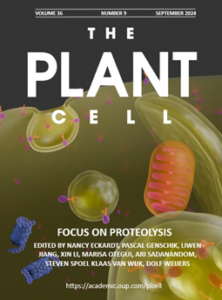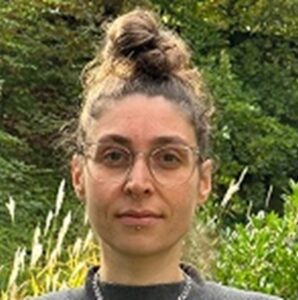Celebrating the September 2024 Focus Issue on Proteolysis
September 23, 2024
1:00 PM UTC | 9:00 AM EST
 Proteolysis is an essential cellular function that mediates the processing and turnover of proteins. Proteolytic post-translational control of protein stability is also a central feature of cellular signaling and crucial for almost all aspects of plant biology, including vegetative growth, development, reproduction, and stress responses. The September 2024 Focus Issue of The Plant Cell, edited by Nan Eckardt, Pascal Genschik, Liwen Jiang, Xin Li, Marisa Otegui, Ari Sadanandom, Steven Spoel, Klaas van Wijk, and Dolf Weijers, spotlights research on plant proteolysis. This webinar features speakers Marcela Rojas-Pierce, Leila Feiz, and Jiorgos Kourelis, who share findings from their work appearing in this Focus Issue. The webinar is hosted by Plant Cell Reviewing Editor Ari Sadanandom and moderated by Assistant Features Editor Margot Raffeiner.
Proteolysis is an essential cellular function that mediates the processing and turnover of proteins. Proteolytic post-translational control of protein stability is also a central feature of cellular signaling and crucial for almost all aspects of plant biology, including vegetative growth, development, reproduction, and stress responses. The September 2024 Focus Issue of The Plant Cell, edited by Nan Eckardt, Pascal Genschik, Liwen Jiang, Xin Li, Marisa Otegui, Ari Sadanandom, Steven Spoel, Klaas van Wijk, and Dolf Weijers, spotlights research on plant proteolysis. This webinar features speakers Marcela Rojas-Pierce, Leila Feiz, and Jiorgos Kourelis, who share findings from their work appearing in this Focus Issue. The webinar is hosted by Plant Cell Reviewing Editor Ari Sadanandom and moderated by Assistant Features Editor Margot Raffeiner.
Speakers
 Marcela Rojas-Pierce: Rapid depletion of target proteins in plants by an inducible protein degradation system.
Marcela Rojas-Pierce: Rapid depletion of target proteins in plants by an inducible protein degradation system.
Marcela Rojas-Pierce is a Professor in the Department of Plant and Microbial Biology at North Carolina State University. She holds a PhD in Botany from the University of California, Riverside. Prof. Rojas-Pierce aims to identify the molecular mechanisms that regulate the biogenesis of the vacuole and the delivery of tonoplast proteins to the vacuolar membrane in Arabidopsis thaliana, as well as mechanisms linking vacuole dynamics with environmental cues.
 Leila Feiz: COI1 F-box proteins regulate DELLA protein levels, growth, and photosynthetic efficiency in maize.
Leila Feiz: COI1 F-box proteins regulate DELLA protein levels, growth, and photosynthetic efficiency in maize.
Leila earned a BS in General Biology from Shiraz University and an MS in Cell and Molecular Biology from Tehran University, both in Iran. She then obtained a second MS in Plant Science from UMR5546 Toulouse 3 University in France before pursuing a PhD in Plant Genetics at Montana State University, Bozeman. After graduating, she worked as a postdoc and later a research associate at the Boyce Thompson Institute, where she discovered two essential Rubisco chaperones, advancing plant Rubisco assembly. Her later research addressed a few questions in chloroplast gene regulation and C4 plant development. Currently, her research is focused on plant proteolysis, including E3 ligase and proteasome degradation, and autophagy, with applications in plant cell and developmental biology, and responses to biotic and abiotic stresses.
 Jiorgos Kourelis: Bioengineering secreted proteases converts divergent Rcr3 orthologs and paralogs into extracellular immune co-receptors.
Jiorgos Kourelis: Bioengineering secreted proteases converts divergent Rcr3 orthologs and paralogs into extracellular immune co-receptors.
Jiorgos is a lecturer in Plant Sciences and Food Security at the Imperial College London. He completed his PhD at the University of Oxford and postdoctoral work at the Sainsbury Lab in Norwich, U.K. His research addresses fundamental questions in plant-microbe interactions. Specifically, how do immune receptors function and evolve, and can we harness this knowledge to bioengineer made-to-order disease-resistance genes? To answer these questions he utilizes a unique interdisciplinary approach, combining bioinformatics and evolutionary biology with synthetic biology expertise, and mechanistic interpretation through comprehensive reference dataset generation. He has increasingly integrated discoveries outside of plant sciences into his research.
Moderator
 Margot Raffeiner, The Plant Cell Assistant Features Editor
Margot Raffeiner, The Plant Cell Assistant Features Editor
Margot is a postdoctoral researcher at the Ruhr-University Bochum (Germany) in the group of Prof. Suayb Üstün. She works on the ERC-funded project DIVERSIPHAGY on selective autophagy mechanisms during plant-bacteria interaction. Margot completed her PhD in the Laboratory of Prof. Frederik Börnke in Germany where she characterized the type-III effector protein XopS from the bacterial pathogen Xanthomonas campestris pv. vesicatoria. She discovered that XopS targets and stabilizes a WRKY transcription factor to regulate defense hormone responses and preinvasion immunity in pepper. Her postdoctoral work is focused on unraveling novel autophagy components as well as studying the interplay between different protein degradation pathways that allow maintenance of plant proteostasis.
Host
 Ari Sadanandom, The Plant Cell Guest Editor
Ari Sadanandom, The Plant Cell Guest Editor
Ari Sadanandom is a Professor in the Department of Biosciences at the University of Durham, UK. Ari Sadanandom is also director of the Durham Centre for Crop Improvement technology, a multi-disciplinary research centre that works with Agritech industry to develop technology that is effective in field conditions. Ari Sadanandom has pioneered the area of (Small Ubiquitin-like Modifier), SUMO protein modification in plants. His research group has demonstrated that SUMOylation coordinates growth control with changing environmental conditions by directly modifying the activity of major transcriptional regulators in plants. The current focus of his research group is to understand how protein modifications influence plant responses to invading pathogens. Ari is also a co-founding member of the Plant Proteostasis community and the UK rice research network.
_______________________________


